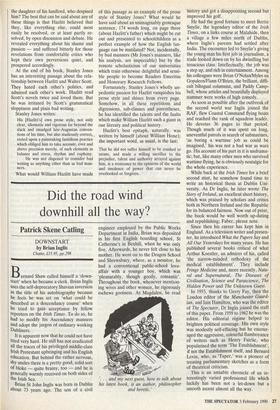Did the road wind downhill all the way?
Patrick Skene Catling
DOWNSTART by Brian Inglis Chatto, £15.95, pp.298 Bernard Shaw called himself a 'down- start' when he became a clerk. Brian Inglis uses the self-deprecatory Shavian inversion as the title of his autobiography because he feels he was set on 'what could be described as a descendancy course' when he tried to gain acceptance by fellow reporters on the Irish Times. To do so, he had to modify his Ascendancy manners and adopt the jargon of ordinary working Dubliners.
It is apparent now that he could not have tried very hard. He still has not eradicated all the traces of his privileged middle-class Irish Protestant upbringing and his English education. But behind the rather nervous, shy smiles there is a pretty good, solid sort of bloke — quite brainy, too — and he is generally warmly received on both sides of the Irish Sea.
Brian St John Inglis was born in Dublin about 73 years ago. The son of a civil engineer employed by the Public Works Department in India, Brian was deposited in his first English boarding school, St Catherine's in Bexhill, when he was only five. Afterwards, he never felt close to his mother. He went on to the Dragon School and Shrewsbury, where, as a monitor, he had a conventional public-school love- affair with a younger boy, which was 'pleasurably, though gooily, romantic'. Throughout the book, whenever mention- ing wives and other women, he rigorously eschews gooiness. At Magdalen, he read and my next guest, here to talk about his latest book, is an author, philosopher and heretic.' history and got a disappointing second but improved his golf.
He had the good fortune to meet Bertie Smylie, the legendary editor of the Irish Times, on a links course at Malahide, then a Village a few miles north of Dublin, where Inglis's parents had settled after India. The encounter led to Smylie's giving the young man his first job in journalism, a trade looked down on by his dwindling but tenacious class. Intellectually, the job was a step up, and rich in entertainment. Among his colleagues were Brian O'Nolan/Myles na Gopaleen/Flann O'Brien, the brilliant, diffi- cult bilingual columnist, and Paddy Camp- bell, whose articles and beautifully displayed stammer were works of high comedy.
As soon as possible after the outbreak of the second world war Inglis joined the RAF, flew Coastal Command flying boats and reached the rank of squadron leader, He devotes 36 pages to that period. Though much of it was spent on long, uneventful patrols in search of submarines, 'as boring a wartime job as could be imagined,' his was not a bad war as wars go. His account of his part in it is undrama- tic; but, like many other men who survived wartime flying, he is obviously nostalgic for the whole experience.
While back at the Irish Times for a brief second stint, he somehow found time to write an historical thesis at Dublin Uni- versity. As Dr Inglis, he later wrote The Story of Ireland, an excellent short history, which was praised by scholars and critics both in Northern Ireland and the Republic for its balanced fairness. Now out of print, the book would be well worth up-dating and republishing; Faber, please note.
Since then his career has kept him in England. As a television writer and presen- ter, he introduced What the Papers Say and All Our Yesterdays for many years. He has published several books critical of what Arthur Koestler, an admirer of his, called 'the narrow-minded orthodoxy of the medical establishment'. They include Fringe Medicine and, more recently, Natu- ral and Supernatural, The Diseases of Civilisation, Science and Parascience, The Hidden Power and The Unknown Guest.
In 1953, thanks to Gerry Fay, then the London editor of the Manchester Guard- ian, and lain Hamilton, who was the editor of The Spectator, Dr Inglis joined the staff of this paper. From 1959 to 1962 he was the editor. His editorial regime helped to brighten political coverage. His own style was modestly self-effacing but he encour- aged the aggressive, colourful flamboyance of writers such as Henry Fairlie, who popularised the term 'The Establishment', if not the Establishment itself, and Bernard Levin, who, as 'Taper,' was a pioneer of treating parliamentary sketches as a form of theatrical criticism.
This is an amiable chronicle of an in- terestingly varied professional life which luckily has been not a let-down but a smooth ascent almost all the way.


















































 Previous page
Previous page